There are lots of ways to name a business, or a product. And, the addition of a strap line can take the name a little further. From nonsensical words, like Google, to highly descriptive names, like Compare the Market – there are just so many ways to think about naming. As a small business, there are a few things to think about that can make your name work much harder for your business.
Four ways to name a business
1) Nonsense names – e.g. Google
The benefit of a name like this is that once you’ve lodged a meaning in someone’s mind attached to this word, you own it. The difficulty (and expense) is getting people to attach meaning to an unknown word, or to a word with an existing meaning (Like Apple, or Orange – what is it with fruit?). You will initially have to explain what you do. There is an opportunity for conversation in this, but it can also risk people not understanding what you offer.
2) Founder names or initials – e.g. Marks & Spencer
As above, once you’ve attached values and meaning to a name – it’s yours. It can also express traditionalism, that in industries like law or accounting, can be appropriate. In a smaller business, it can create succession and exit issues. If you have growth, or a fat cheque for what you’ve built, in mind then naming the business after yourself is not usually a good move.
3) Descriptive names – e.g. Compare the Market, or WeBuyAnyCar.com
Where clarity matters, descriptive names work best. When you want to make sure people understand what you do – having a name that tells them can be very helpful. The potential pitfall is in extending your business – if you’ve been extremely descriptive, adding new products lines, etc. can be tough. But, as Carphone Warehouse have shown, not impossible.
4) Conceptual names – e.g. Smarta
Then there’s a name that says something about you, but not exactly what you do. This is usually something that expresses your values. The great thing about this kind of name is that you can own it, like the nonsense name, and you can use it to tag onto a range. When I originally chose Clear Thought as my company name, it said something about my approach – but I could have easily extended from marketing, to finance, IT, etc.
However you choose to name your business, you have the opportunity to make it work even harder for you with the addition of a strap line. This can be integrated into your logo. Here are the three things to have on your list when briefing or working on this for your own business.
The three tasks for your company name
In the worked example that runs through my book Watertight Marketing, I’ve used a fictional company – VA-Voom! The strap line is: Virtual Assistants. Real Potential.
1) What you do
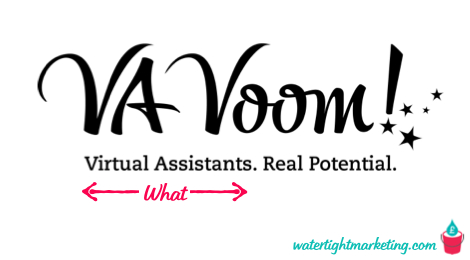
Somewhere in either the name or the strap line, I’d recommend that you tell people (in pretty simple terms) what you do. It can be so easy to get yourself filed incorrectly in someone’s mind… making it crystal clear in the logo that appears on practically every document, etc. can definitely help.
2) How you do it, or your values / style
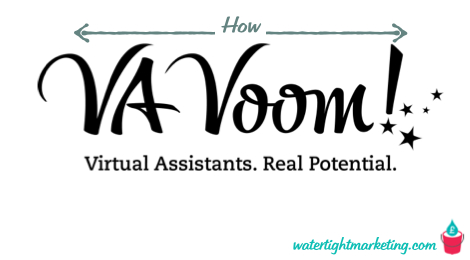 If you can also give a sense it will feel like to work with you, you’re onto a winner. This is about values and personality. For VA-Voom! we wanted to express speed, and the feeling of someone waving a magic wand. This is also picked up in the styling of the logo.
If you can also give a sense it will feel like to work with you, you’re onto a winner. This is about values and personality. For VA-Voom! we wanted to express speed, and the feeling of someone waving a magic wand. This is also picked up in the styling of the logo.
3) Why people would want it
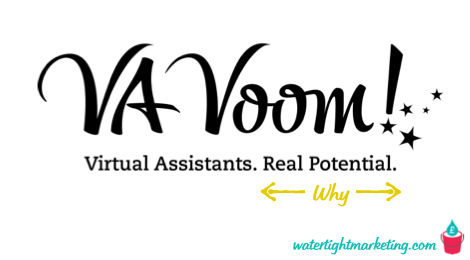 And, of course, there’s the why. I’d always recommend include is a sense of the key benefit of working with you – i.e. how will their life be tangibly better. If you’ve read about The Logic Sandwich – this is where you want to get to that ‘towards’ emotion in place, so that people have a sense of what they’re headed towards.
And, of course, there’s the why. I’d always recommend include is a sense of the key benefit of working with you – i.e. how will their life be tangibly better. If you’ve read about The Logic Sandwich – this is where you want to get to that ‘towards’ emotion in place, so that people have a sense of what they’re headed towards.
Take a look at this video tutorial, which is taken from the Watertight Whiteboard.
You can access over 50 hours of marketing tips videos like this for just £20 per month.
You can mix and match how you put these elements together. A descriptive name (what), with a conceptual (how) and benefits-driven (why) strap line, or a benefits-led (why) name with the what and how. But, if you can cover these three bases, you have a hard-working name for your business.
© Bryony Thomas – The Watertight Marketer

Bryony Thomas
Author & Founder, Watertight Marketing
Bryony Thomas is the creator of the multi-award winning Watertight Marketing methodology, captured in her best-selling book of the same name. She is one of the UK's foremost marketing thinkers, featured by the likes of Forbes, The Guardian, Business Insider and many more, and in-demand speaker for business conferences, in-house sales days and high-level Board strategy days.

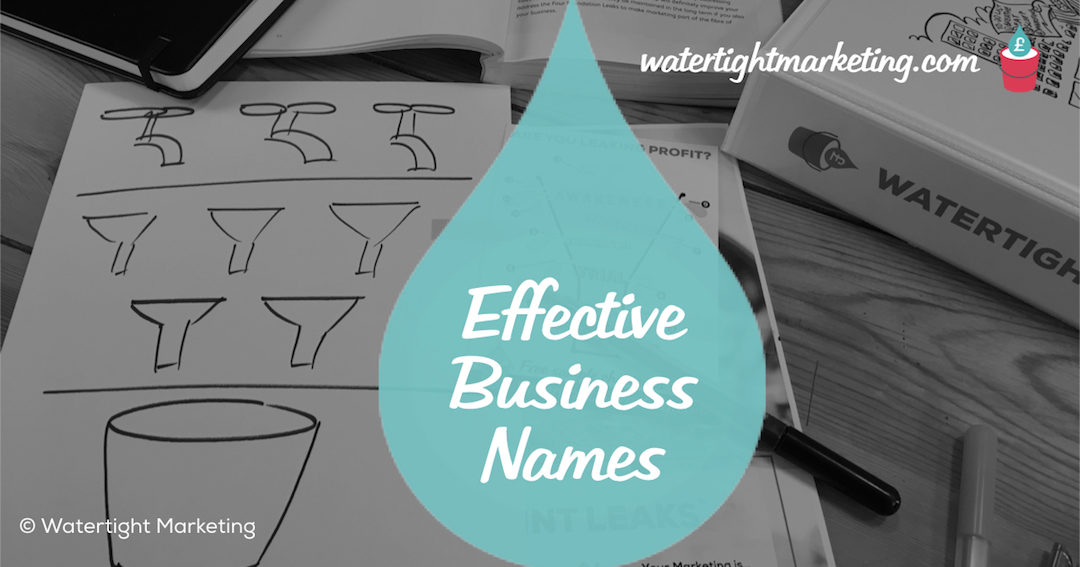
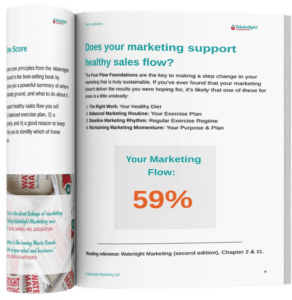
Thanks Bryony, the examples were great and it provided some very timely advice for me!
Delighted to hear it. Do let us know what you come up with 🙂
Our company is called Shinethrough Cleaning Services Limited and is established in the local area. We undertake both domestic/commercial, janitorial / deep-cleans amongst other services. As we have invested in a new web site, we are looking to achieve a ‘strapline’ that indicates the quality of our service as our company name indicates our main service. Can you advise?
John Daniels
Great post! Your details are very helpful. Thanks for your work.
I see something truly interesting about your site so I saved to favorites.